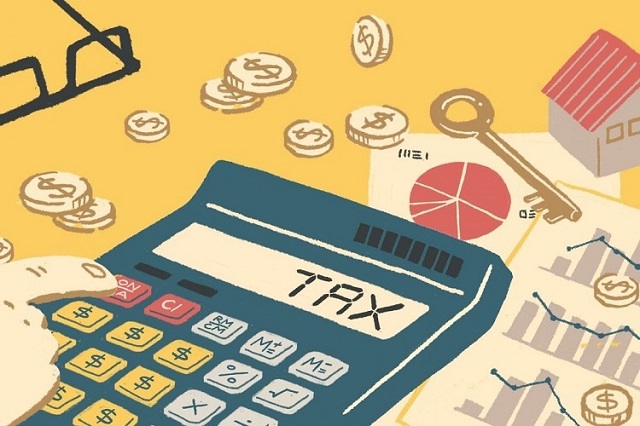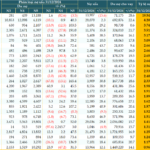
The People’s Committee of Cần Thơ City recently provided feedback on the draft Law on Personal Income Tax (amended) proposed by the Ministry of Finance. They suggested that the government should consider expanding the tax base and proposed that interest income from savings accounts should only be exempt from personal income tax up to a certain threshold.
Currently, individuals do not pay tax on interest earned from deposits, including non-term and term deposits, savings accounts, certificates of deposit, promissory notes, and other similar instruments offered by credit institutions and foreign bank branches. This exemption applies to the full amount of the principal and interest received.
Under the current regulations, only interest income earned by companies and enterprises is subject to corporate income tax.
Taxing All Income-Generating Assets
According to Associate Professor Dr. Nguyen Huu Huan from the University of Economics Ho Chi Minh City, some countries do tax interest income from savings accounts. However, if Vietnam were to implement such a tax, it should be part of a broader tax on all income-generating assets, including stocks, gold, real estate, and savings. This would ensure a comprehensive approach to taxation and prevent tax avoidance through asset diversification.
Dr. Huan also emphasized the need to determine an appropriate tax rate if such a tax were to be implemented. He pointed out that individuals who save money in banks are primarily concerned about the net interest they receive. To remain competitive and retain customers, banks may need to increase interest rates on deposits, which could compress their net interest margins.
“Additionally, if income tax is applied to savings accounts, it should be applied consistently across all assets. Otherwise, there is a risk of people withdrawing their savings and investing in gold or other assets to avoid taxation. Moreover, there may be a psychological impact on savers, leading some to withdraw their funds from banks. Over time, the impact of such a tax may not be as significant as expected,” Dr. Huan added.
Double Taxation Concerns
Associate Professor Dr. Dinh Trong Thinh, an economic expert, noted that while many countries tax interest income from savings, Vietnam had considered and rejected this idea in the past. He argued that taxing interest income from savings accounts could do more harm than good.
Dr. Thinh explained that income earned by individuals is already subject to various taxes, including corporate income tax and personal income tax. Money saved in banks is a way to channel resources for investment and development through bank credit. Therefore, taxing interest income from savings would effectively result in double taxation.
He further warned that imposing a tax on savings account interest could discourage people from saving, impacting banks’ ability to mobilize capital and affecting the allocation of credit.
Balancing Individual and Economic Interests
Mr. Nguyen Quang Huy from Nguyen Trai University emphasized the need to carefully consider the potential impacts of imposing personal income tax on savings account interest. He argued that the majority of individuals’ savings come from legitimate sources, such as salaries, wages, and business investments. Therefore, the interest earned on these savings is not a new source of income but rather a result of accumulating previously taxed income.
Mr. Huy pointed out that savings are not just an investment vehicle but also a way for individuals to protect themselves financially against future risks. For many, especially retirees and those with long-term financial plans, interest income from savings is a crucial source of stable income and financial security.
Any changes to the tax policy regarding this income could influence savings behavior and lead individuals to seek alternative ways to protect their assets. This could have repercussions not only for individuals but also for the stability of the banking system’s capital flows.
Mr. Huy concluded that tax policy adjustments require a comprehensive perspective that considers both budget revenues and the stability of the financial system, while also protecting individuals’ interests. In the current context, interest income from savings accounts reflects individuals’ financial prudence, responsibility, and proactive planning for their future.
“Any changes to the tax policy regarding interest income from savings accounts should be carefully considered from multiple angles, including budgetary, psychological, financial stability, and sustainable economic development. A good policy should incentivize development rather than inadvertently changing financial habits that contribute to the overall stability of the economy”, Mr. Huy added.
– 10:00 20/02/2025
How to Prevent Bad Debt from Becoming an Economic Hindrance?
The rising tide of non-performing loans is a significant challenge for Vietnam’s banking system. It is not merely about managing bad debt but also about building a foundation for businesses to thrive and grow in an ever-changing world, ensuring that non-performing loans do not hinder the development of the financial system.
Do Bonuses for the Vietnamese National Football Team Have to Pay Personal Income Tax?
At a press conference held by the Ministry of Finance on January 7, Deputy Director of the General Department of Taxation, Mai Son, announced that the monetary bonuses and commemorative medals awarded to the Vietnamese football players following their victory in the 2024 ASEAN Cup will be exempt from personal income tax.
The 2024 Total Budget Revenue Surpasses the Estimate by 17.4%
The year 2024 witnessed the relentless endeavors of the Ministry of Finance in executing its fiscal and state budget duties. Through agile and assertive fiscal policies, the Ministry achieved commendable outcomes in budget revenue and expenditure, significantly contributing to macroeconomic stability, inflation control, and social welfare assurance.
What Do We Learn from the Record State Budget Collection?
This year, for the first time, the budget revenue reached an impressive figure of over 1.7 quadrillion VND, surpassing the 2023 figure by 13.7%. Despite this remarkable achievement, there are still underlying issues with the budget revenue, including an outdated personal income tax policy that poses the risk of tax losses.




















